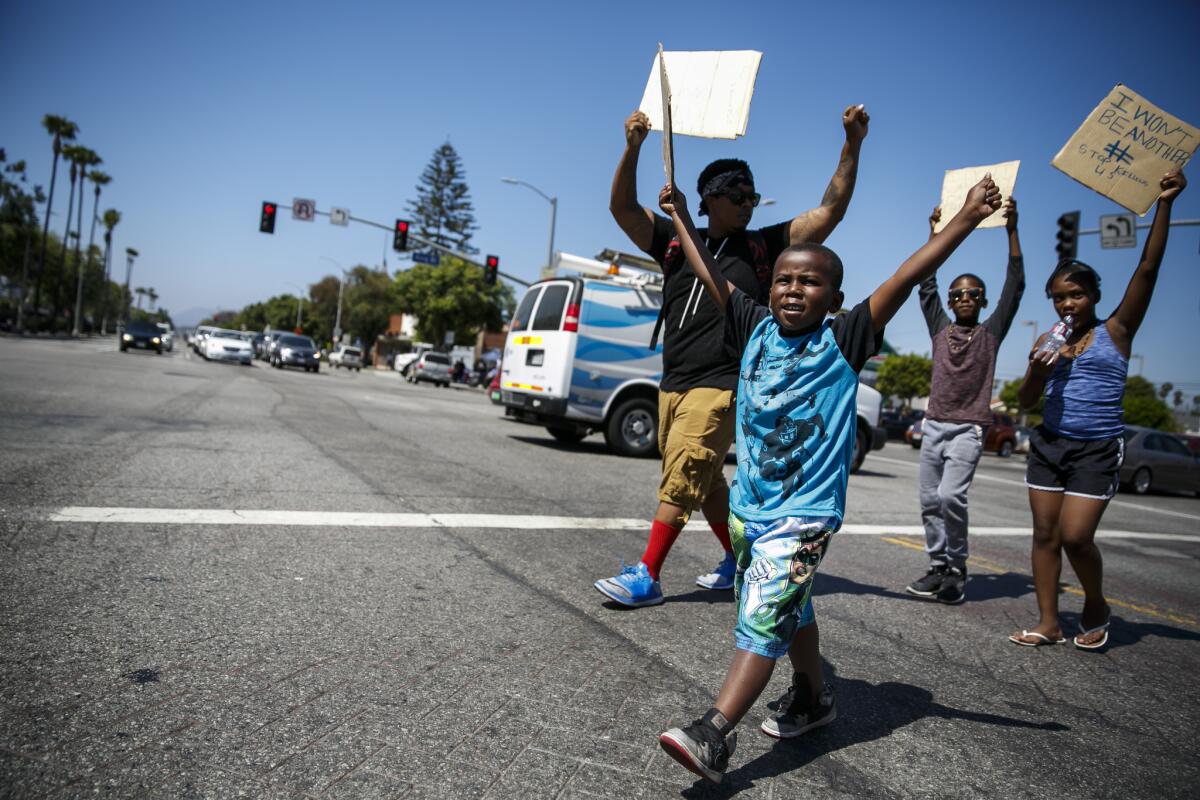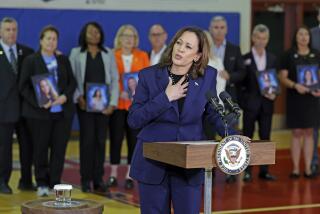‘Why are people mad at each other?’ Explaining another shocking week of violence to your kids

- Share via
A 13-year-old in California shook her head at the TV. A 5-year-old in Pittsburgh asked her father why people are so angry.
As America coped with one tragic moment after another this week, with the deaths of Alton Sterling and Philando Castile followed by the shooting of a dozen police officers in Dallas, the country’s parents had an added task: explaining each act of violence to their children.
“If [children] see a bunch of this on television, they can become the indirect victims of trauma,” said Suzanne Silverstein, director of the Cedars-Sinai Psychological Trauma Center.
African American children might be afraid for their own lives or for their friends and families when they see black men being shot. Children of law enforcement officers might be even more afraid for their parents after learning what happened in Dallas.
“What the parents need to do is … listen first and ask the kids what are they feeling, what are they thinking,” Silverstein said. “The hardest part is how to make kids feel secure. … There’s no real easy answer for this one.”
It’s important for parents to talk to children about big news events like Dallas before they hear about it from other children at school or during summer activities, Silverstein said. That way, parents can offer to answer any questions and can see whether their child seems nervous or behaves differently than he or she usually does. If so, that could be a sign of anxiety.
Meanwhile, African American parents are trying to reconcile the need to tell their children to act carefully around police officers, but also to make sure they understand that frustration should not turn into violence against police.
After Sterling was shot in Louisiana, Richard Milner’s 5-year-old twin daughters asked him, “Why are people mad at each other?”
Milner, who directs the Center for Urban Education at the University of Pittsburgh, said he and his wife try to protect their daughters from the images of violence. But they do watch the news in front of them occasionally, and the girls overhear them talking about current events.
Live updates: Dallas police shooting »
“We are very careful about what we say,” Milner said. “But we also are not trying to guard them from the realities of what’s happening.”
Their approach is to answer the kids’ questions as they arise. And if a question is too complicated, Milton encourages their curiosity, but provides an age-appropriate response.
“What I really want to say is, “It’s complex and it’s complicated and I can’t really explain it to you now,’ ” Milner said. “But I try to affirm them and validate their questions.” He used the conversation to remind them that sometimes people don’t agree, but the right solution is to talk rather than resort to violence.
Antoinette Barrett, a nurse practitioner who lives in La Mirada, said she’s seen her 13-year-old daughter walk past the TV this week and just shake her head. At 13, she’s old enough to understand what’s happening but too young to know why, Barrett said.
“I don’t have an answer,” Barrett said. “I just try to reassure her that there’s good and there’s bad, and there’s more good than bad.” Barrett hasn’t talked to her daughter about Dallas yet because she wants to have all the information first.
As much as she teaches her children to understand the history of racism in the U.S., Barrett also wants them to understand the role police play in keeping them safe, she said.
“I want her to have an awareness,” Barrett said. “And police getting shot — that’s not right, and that’s not the answer.”
UCLA education professor Tyrone Howard started talking to his four children, now ages 17 to 24, about race as early as age 6, he said. Like Milner’s children, he said, they learned to be proud to be black. But they also knew they would be held to a higher standard than many of their white peers and that there is a history of violence against and a fear of black people.
“That’s just been part of what they’ve known from a very, very young age,” Howard said.
Still, he called all three of his sons this week, as he does whenever there are police shootings. He reminds them to comply. But Howard can’t answer for everything, like when his 24-year-old says that some men who are complying are also dying.
“You know that you can only protect them so much,” Howard said. “Sometimes at night, I can’t sleep until I know my kids are at home.”
That feeling often doesn’t go away. Milner is 42, but he still fields calls from his dad every time there’s a major shooting.
Be careful, his father warns.
ALSO
Dallas gunman was Army reservist who served in Afghanistan
Use of robot in Dallas highlights tactical opportunities, ethical questions for police
Police officers resentful, afraid and less motivated after Dallas massacre, Gardena chief says
More to Read
Sign up for Essential California
The most important California stories and recommendations in your inbox every morning.
You may occasionally receive promotional content from the Los Angeles Times.














